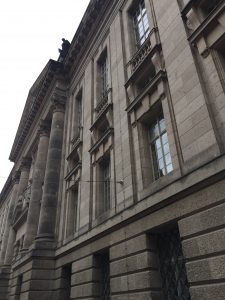
I recently completed my final research trip for project ERIN. I visited Berlin for five days to research at the Staatsbibliothek (SBB). This was my first time visiting the SBB and Berlin. The Staatsbibliothek zu Berlin has four branches; Unter den Linden, Potsdamer Straβe, Westhafen and bpk-Bildagentur. I needed to visit the Music Reading Room (Musik-Lesessal), which is located at the Unter den Linden site, and the Manuscripts Reading Room (Handschriften-Lesessal), which is located at the main site on Potsdamer Strasse; both branches are located within the Berlin Mitte district. The closest U-bahn stops are Friedrichstrasse and Potsdamer Platz respectively.
Readers who are not resident in Berlin may register online prior to visiting the library; click on the following link and select Registration Form via SSL Access http:// staatsbibliothek-berlin.de/en/service/anmeldung/. Shortly after you submit the registration form you should receive an email acknowledgement. In order to adequately prepare for your visit, especially if travelling to Berlin from outside Germany, it is important to include the dates of your intended visit on the registration form. You should receive your library card number and a password via email exactly one week before the date of your arrival at the SBB. Once you receive this information you can login to the SBB’s online catalogue and place your order in advance of your visit. Since it may take 2-3 days to retrieve some items, it is important to allow adequate time when placing your order. It should also be noted that orders are held for eight days only, it is therefore recommended not to place your order too far in advance of your visit. If you experience any difficulties using the online system you can email your request directly to the relevant library department; click on the following link for a list of the SBB’s departments and contact details https://staatsbibliothek-berlin.de/en/about-the-library/departments/.
To order material when in the Music Reading Room complete a white call-slip, available at the issue desk. When researching in the Manuscripts Reading Room complete a pink callslip, available at the issue desk there. One call-slip must be completed per item. There is approximately a two hour wait time for orders placed in the Music Reading Room and a one hour wait time for orders placed in the Manuscripts Reading Room. If researching in the Music Reading Room it is important to be aware that orders placed before 11am can be retrieved on the same day, but orders placed after 2pm will not be retrieved until the following day.
On arrival at the library you will need to complete the registration process; this can be done at either the Unter den Linden or Potsdamer sites. Since I had planned to begin my research in the Music Reading Room it was most convenient for me to complete the registration process at the Unter den Linden site. The entrance to the Unter den Linden site is located on Dorotheenstraβe. To complete registration visit the issue desk on the first floor, submit a print out of the completed online registration form and present your passport for identification purposes. Registration for one month costs €12 and registration for one year costs €30. The library card is issued immediately and payment is made using an automatic cash machine located to the right of the issue desk. It is not permitted to bring bags or coats into the reading rooms. I found the locker system in use at both the Unter den Linden and Potsdamer sites to be a little unusual as some lockers require padlocks. I am unsure if the padlocks are supplied by the library of if you need to bring your own; I suspect the latter. All lockers are located in the foyer on the ground floor at both Unter den Linden and Potsdamer. It is imperative to arrive at the library in the early morning, preferably before 10am, if you wish to avail of a locker with its own key, for which you will need a €1 coin. If there are no lockers available one must leave all belongings in a cloakroom which is manned by a porter. A numbered token is issued for retrieving belongings from the cloakroom before you leave the library.
The Music Reading Room is located on the first floor at the Unter den Linden site and accommodates 36 readers. Facilities include PCs and microfilm machines. The reading room is spacious and the work desks are large, so there is adequate space for working with larger sources. The Manuscripts Reading Room is located on level three at the Potsdamer site and accommodates up to 24 readers. Wifi is available at both Unter den Linden and Potsdamer sites. Opening times for the Music and Manuscripts Reading Rooms vary; consult the SBB’s website for information about reading room times and closure dates; a link to the library’s homepage is provided here http://staatsbibliothek-berlin.de. There is a café onsite at Potsdamer and a selection of vending machines are located in the foyer at Unter den Linden. The staff at both sites were friendly and very helpful.
In my next blog I will provide an account of my experience researching at the Lipperheidesche Kostuembibliothek (Lipperheide Costume Library) which is located at the Kunstbibliothek, 6 Matthäikirchplatz, Berlin.
This research trip was kindly and generously funded by the Keats-Shelly Association of America, Carl H. Pforzheimer, Jr., Research Grant 2017.
